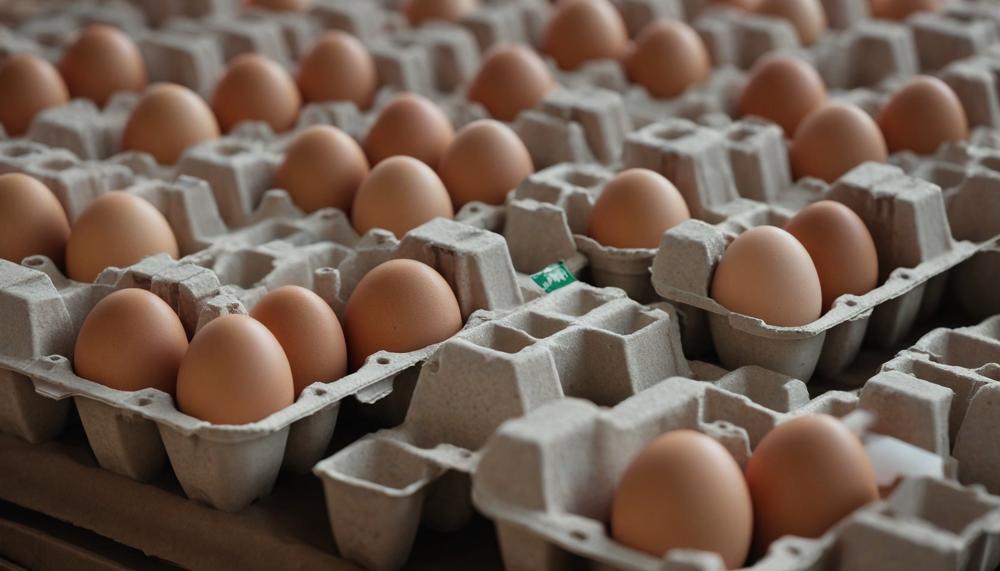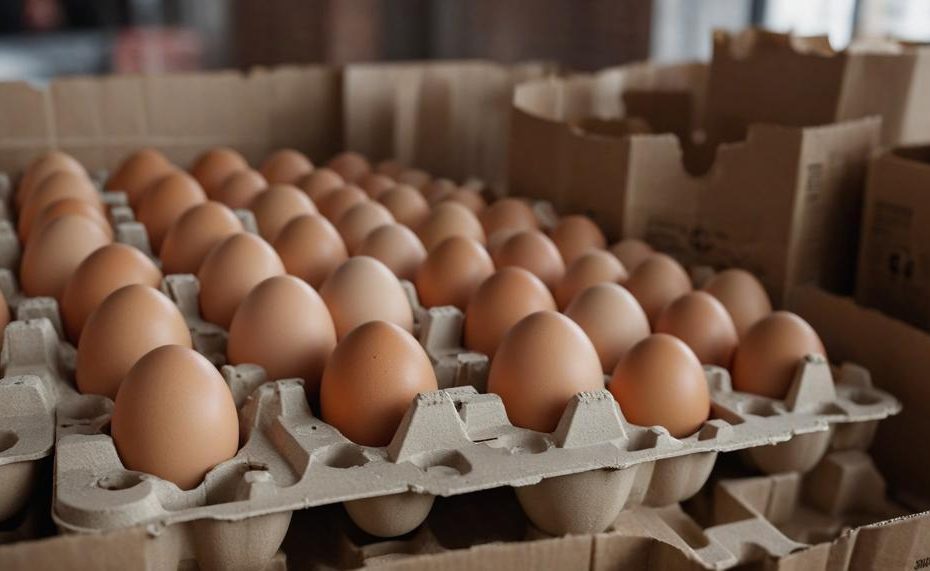Are egg cartons recyclable? The short answer is: Yes. However, the recyclability of egg cartons depends on the material they are made from. Let’s crack open the details:
- Paper/Pulp Cartons: Made from recycled paper, these are the most eco-friendly. They can be recycled again, composted, or even used for DIY projects.
- Plastic Cartons: Often made from PET plastic, these can be recycled into a wide variety of products, from packaging to textiles.
- Styrofoam Cartons: The tricky ones. While curbside recycling programs usually don’t accept them, some local facilities or specific drop-off points might.
Egg cartons play a significant role in our sustainability efforts. Here’s what you need to know to ensure you’re recycling them properly:
- Look for Symbols: Ensure your paper egg cartons have the universal recycling symbol before tossing them in the bin.
- Consider Reuse Programs: Some grocery stores and farms accept used egg cartons for reuse.
- Choose Wisely: Opt for paper or plastic cartons if you want to compost or recycle them later.
- Styrofoam Caution: These are best avoided due to their limited recyclability. If you must use them, check local guidelines for specific disposal options.
- Get Creative: Repurpose clean egg cartons for storage, crafts, or gardening.
By being mindful of the type of egg carton you purchase and dispose of, you can contribute to a greener planet. Ready to dive deeper into the world of egg carton recycling? Let’s explore how you can make smarter, more sustainable choices.
Contents
Types of Egg Cartons
Egg cartons come in various materials, each with different recycling possibilities. Here’s a breakdown of the common types of egg cartons and their recyclability:
| Type of Egg Carton | Material | Recyclability |
| Paper Cartons | Pulp Paper/Cardboard | Yes, generally recyclable and compostable |
| Plastic Cartons | Polyethylene Terephthalate (PET) or Polystyrene (PS) | Yes, if marked with a recycling symbol |
| Styrofoam Cartons | Expanded Polystyrene (EPS) | No, not typically accepted by curbside recycling; specific locations may accept them |
Details and Considerations
- Paper Egg Cartons
- Material: Made from recycled pulp paper or cardboard.
- Recyclability: Highly recyclable and can also be composted. Ensure they are clean and free from food residue before placing them in the recycling bin.
- Environmental Impact: Biodegradable and have a lower carbon footprint. They can be reused in various creative ways, such as for crafts or seed starters.
- Plastic Egg Cartons
- Material: Typically made from PET or polystyrene.
- Recyclability: Generally recyclable if they have a recycling symbol. It’s important to check local recycling guidelines as they may vary.
- Environmental Impact: PET plastics are more eco-friendly compared to Styrofoam, as they can be recycled into numerous products like packaging, textiles, and more. Clean plastic cartons thoroughly before recycling.
- Styrofoam Egg Cartons
- Material: Made from expanded polystyrene (EPS).
- Recyclability: Not widely accepted in curbside recycling programs due to difficulty in processing. However, some local recycling centers or special collection programs may accept them.
- Environmental Impact: Least environmentally friendly option. They do not break down easily in the environment and have limited recycling opportunities.

Recycling Paper Egg Cartons
The short answer is that paper egg cartons can be recycled by following a straightforward process. Here’s a detailed breakdown:
- Ensure Cleanliness: Make sure the cartons are free from food residue or contaminants. This step is crucial because any organic material can interfere with the recycling process.
- Breaking Down: Tear or cut the cartons into smaller pieces. This makes it easier for the recycling machinery to handle and process them.
- Separating Fibers: In a recycling facility, the paper fibers from the cartons are separated and cleansed. This involves soaking the paper to break it down into a pulp, removing any inks, adhesives, or other non-paper elements.
- Repurposing: The cleaned fibers are then reshaped into new recycled paper products. These could be new egg cartons, construction materials, or various paper products.
Recycling Process Summary
| Step | Description | Details |
| Ensure Cleanliness | Remove Food Residue | Check and clean cartons to ensure they are free from any food particles. |
| Breaking Down | Cut into Smaller Pieces | Manually tear or cut the cartons into smaller parts for easier processing. |
| Separating Fibers | Soak and Cleanse | The paper fibers are soaked and separated from contaminants in recycling facilities. |
| Repurposing | Reshape into New Products | The clean fibers are used to produce new paper products, including new egg cartons. |
Recycling Plastic Egg Cartons
Plastic egg cartons can be recycled, but the process hinges on the type of plastic used. Here’s how to ensure proper disposal:
Identify the Plastic Type
- PET (#1) Plastic: These cartons are recyclable through most curbside programs.
- Styrofoam (PS #6) Plastic: These are not recyclable through standard curbside services and must be discarded in the trash or taken to specialized recycling centers.
Preparation for Recycling
- Clean the Carton: Remove any leftover eggs or residues. Clean cartons are less likely to contaminate the recycling stream.
- Check Local Guidelines: Always verify with your local recycling program to ensure they accept PET (#1) plastic cartons.
Recycling Steps for PET (#1) Plastic Cartons
- Curbside Collection: Place the cleaned carton in your curbside recycling bin.
- Drop-off Locations: If curbside recycling isn’t available, find a local recycling center that accepts PET plastics.
Disposal of Styrofoam (PS #6) Plastic Cartons
- Garbage Bin: If no specialized recycling options exist, discard in the regular trash.
- Specialized Recycling Centers: Some areas have facilities for styrofoam recycling; locate one near you.
Recycling Foam Egg Cartons
Recycling foam egg cartons, typically made from polystyrene foam (commonly known as Styrofoam), can be tricky but it’s not impossible. Here’s how to do it properly:
- Check Local Recycling Programs: Not all recycling programs accept foam products. Visit your local recycling centre’s website or contact them directly to confirm if they accept foam egg cartons.
- Clean the Cartons: Ensure the foam cartons are free from any food residue. Rinse and dry them thoroughly before recycling.
- Drop-Off Locations: If your local curbside program doesn’t accept foam, look for special drop-off locations. Some grocery stores and recycling centers have designated bins for foam products.
- Recycling Facilities: Certain facilities specialize in processing polystyrene foam. Use resources like EPS Packaging to locate such facilities.
Environmental Benefits of Recycling Foam Egg Cartons
| Benefit | Explanation | Impact |
| Reduction in Landfill Waste | Foam takes hundreds of years to decompose, so recycling reduces the amount of waste sent to landfills. | Decreased environmental pollution and space used in landfills. |
| Resource Conservation | Recycling foam saves raw materials and energy that would be needed to produce new foam products. | Preserves non-renewable resources and reduces carbon footprint. |
| Pollution Prevention | Proper recycling prevents foam from breaking down into smaller particles, which can contaminate soil and waterways. | Protects ecosystems and reduces microplastic pollution. |
| Economic Benefits | Recycling can create jobs in the waste management and recycling industries. | Boosts local economies and supports sustainable business practices. |
By diligently following these steps, you contribute to a healthier environment. Not only does this practice cut down on landfill waste, but it also conserves resources and prevents pollution.
Environmental Impact of Egg Carton Recycling
Recycling egg cartons substantially lessens their environmental footprint. Compared to plastic or foam alternatives, pulp egg cartons are far more eco-friendly due to their lower carbon emissions and minimal waste production.
Key Benefits of Recycling Egg Cartons:
- Resource Conservation: Recycling egg cartons saves trees and reduces the need for raw materials. Each recycled carton reenters the production cycle, lessening the demand for virgin resources.
- Energy Savings: The energy required to recycle paper products, like egg cartons, is significantly less than that needed to produce new ones. This reduction in energy use helps to cut down greenhouse gas emissions.
- Waste Reduction: By recycling, we divert egg cartons from landfills. This not only reduces landfill waste but also curbs the release of methane, a potent greenhouse gas, from decomposing paper products.
- Pollution Prevention: Recycling reduces the pollution associated with the manufacturing of new products. It limits water pollution and air emissions, leading to a cleaner environment.
- Economic Benefits: Recycling supports the economy by creating jobs in the recycling and manufacturing industries. It also reduces the costs associated with waste management and landfill maintenance.
Conclusion
Recycling egg cartons is an eco-friendly practice that depends on the material of the cartons. Paper or pulp cartons are the greenest option, being recyclable, compostable, and even usable for DIY projects. Plastic cartons, often made from PET, are also recyclable if properly cleaned and marked with the recycling symbol. However, Styrofoam cartons present a challenge as they are not typically accepted in curbside programs, though some specialized facilities or drop-off points might take them.
Choosing paper or plastic cartons over Styrofoam can significantly reduce environmental impact. Paper cartons, in particular, can be composted, adding valuable nutrients to the soil, while recycled plastic can be repurposed into various products. Ensuring clean and sorted recyclables enhances the recycling process’s efficiency and effectiveness.
Reusing cartons creatively, such as for storage, crafts, or gardening, can extend their life and reduce waste. Additionally, participating in reuse programs offered by some grocery stores or farms can further support sustainability efforts.
By making informed choices about the type of egg cartons purchased and properly disposing of them, consumers can contribute to a healthier planet.





